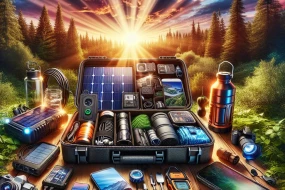
As the world becomes more conscious of environmental sustainability, eco-tourism has emerged as a popular travel trend. But the question remains: how can we ensure this form of tourism is genuinely beneficial to the environment? The answer lies in the symbiotic relationship between eco-tourism and technology. In this article, we delve into why technology is indispensable for modern eco-tourism, exploring practical applications, common pitfalls, and the future of sustainable travel.
The Role of Technology in Sustainable Travel
Technology has revolutionized the way we travel, and it's no different for eco-tourism. From booking platforms that prioritize eco-friendly accommodations to apps that help travelers reduce their carbon footprints, technology provides the tools necessary for a more sustainable travel experience. For instance, platforms like EcoHotels.com allow users to find hotels committed to sustainability practices, offering a tangible way to support eco-friendly businesses.
Enhancing Conservation Efforts
One of the greatest benefits of technology in eco-tourism is its ability to enhance conservation efforts. Drones, for instance, are being used to monitor wildlife populations and track poaching activities in real-time. This not only aids in the protection of endangered species but also helps maintain biodiversity, which is crucial for healthy ecosystems. Technology also facilitates data collection, enabling more informed decisions about conservation strategies.
Improving Environmental Education
Eco-tourism isn't just about travel; it's also about learning. Technology plays a pivotal role in educating tourists about the environments they visit. Interactive apps, virtual reality experiences, and online courses provide valuable insights into local ecosystems and conservation efforts. This knowledge empowers travelers to make conscious decisions that support sustainability, transforming them from passive visitors to active participants in environmental stewardship.
Common Mistakes to Avoid
While technology offers numerous benefits, there are common pitfalls that eco-tourists should avoid.
1) Over-reliance on technology can sometimes lead to a disconnect from the natural environment, so it's important to balance digital engagement with real-world experiences.
2) Failing to verify the sustainability claims of apps and platforms can result in supporting 'greenwashed' businesses.
3) Ignoring local communities and their insights can undermine the cultural aspect of eco-tourism.
The Future of Eco-Tourism and Technology
Looking ahead, the future of eco-tourism is bright, particularly with advancements in technology. Innovations such as blockchain can enhance transparency in the supply chain, ensuring that eco-friendly practices are genuinely upheld. Additionally, the development of low-impact transportation options, like electric vehicles and solar-powered boats, will further reduce the carbon footprint of eco-tourists. As technology continues to evolve, so too will the opportunities for more sustainable travel experiences.






























